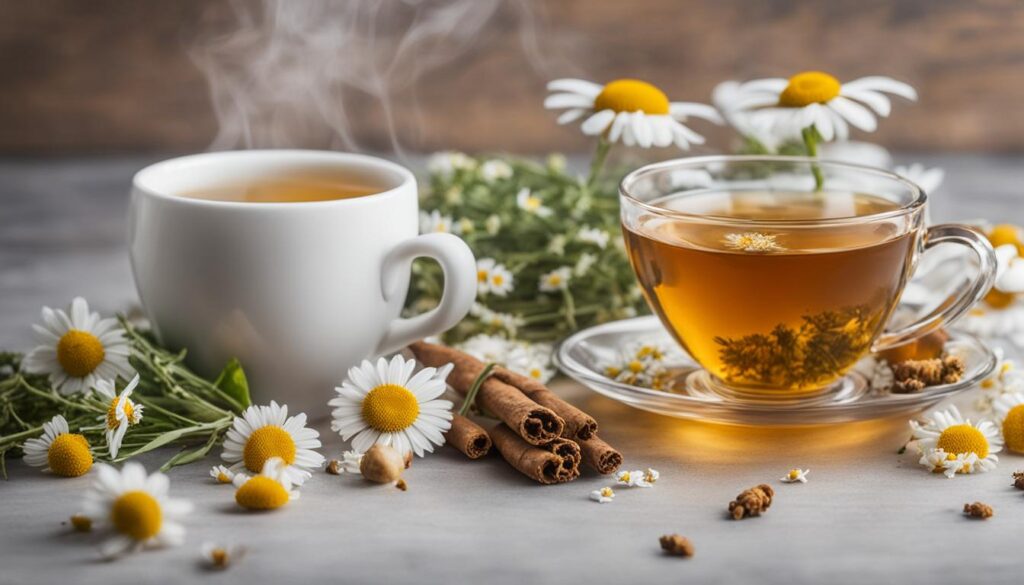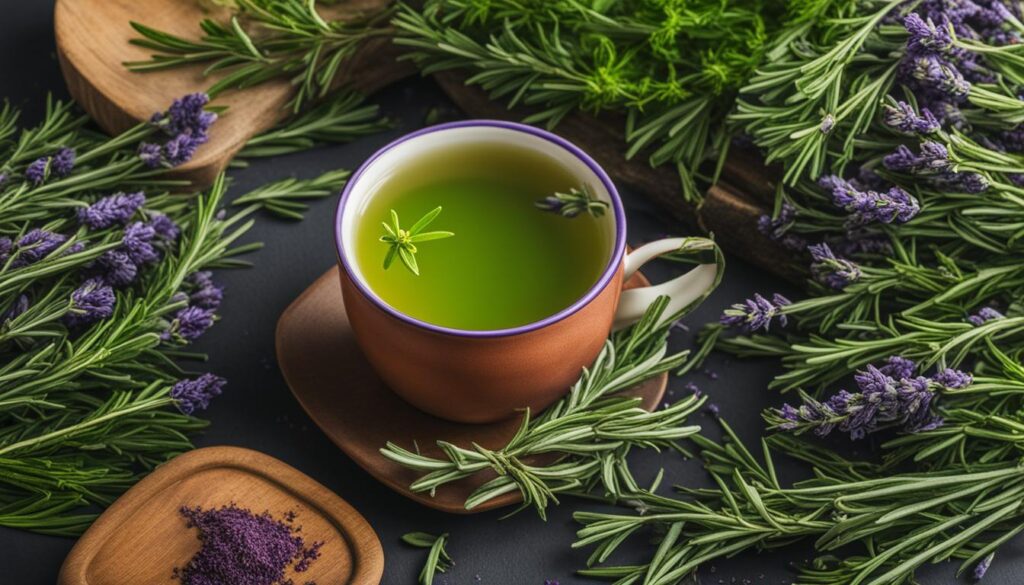Herbal teas have long been revered for their ability to promote good health and reduce stress. Packed with antioxidants and natural anti-inflammatory compounds, these teas offer a host of benefits, including protecting the body from stress, lowering the risk of blood clots, and managing high blood pressure.
When it comes to finding the best herbal teas for stress relief, there are several standout options. Lemon balm, green tea, ginger tea, chamomile tea, and lavender tea have all proven to be effective in improving feelings of stress, anxiety, and depression.
However, it’s crucial to consult with your doctor before incorporating any herbal teas into your routine, as they may interact with certain medications.
Key Takeaways:
- Lemon balm, green tea, ginger tea, chamomile tea, and lavender tea are among the best herbal teas for stress relief.
- These teas have been shown to improve feelings of stress, anxiety, and depression.
- Consult with your doctor before trying any herbal teas, as they may interact with certain medications.
Top Herbs for Stress Relief: Lemon Balm and Green Tea
When it comes to herbal remedies for anxiety and stress, two top contenders stand out: lemon balm and green tea. These herbs have long been recognized for their soothing properties and ability to promote relaxation and well-being.
Lemon Balm
Lemon balm, also known as Melissa officinalis, has been used for centuries as a natural stress reliever. Its calming effects can help reduce anxiety and improve mood. Lemon balm contains compounds that interact with receptors in the brain, promoting a sense of calmness and tranquility.
Research has shown that lemon balm may have a positive impact on stress-related symptoms. In a study published in the Journal of Ethnopharmacology, participants who consumed lemon balm extract experienced a significant reduction in anxiety and improved cognitive performance.
Green Tea
Green tea, derived from the Camellia sinensis plant, is not only a popular beverage but also a powerful herb for stress relief. It contains an amino acid called L-theanine, which is known for its calming effects on the brain.
Several studies have highlighted the stress-reducing benefits of green tea. For example, a study published in the Journal of Physiological Anthropology found that participants who consumed green tea experienced improvements in mental clarity and reduced stress levels.
Green tea is also rich in antioxidants, which can help protect the body from the damaging effects of stress. These antioxidants have been shown to reduce oxidative stress and inflammation, promoting overall well-being.
Comparing Lemon Balm and Green Tea
Both lemon balm and green tea offer unique benefits for stress relief. Lemon balm is particularly effective in promoting relaxation and easing anxiety symptoms, while green tea provides a combination of L-theanine and antioxidants that improve cognitive function and reduce stress levels.
| Herb | Benefits | Research Evidence |
|---|---|---|
| Lemon Balm | Calming and mood-enhancing properties | Studies have shown a reduction in anxiety and improved cognitive performance |
| Green Tea | Calming effects on the brain, antioxidant properties | Research has demonstrated improvements in mental clarity and reduced stress levels |
While both herbs have proven benefits, the choice between lemon balm and green tea ultimately depends on individual preferences and needs. Some individuals may find lemon balm more effective for relaxation, while others may prefer green tea for its cognitive enhancement properties.
It’s important to note that herbal remedies should be used as part of a comprehensive approach to managing stress. Consulting with a healthcare professional is advised, particularly if you have any underlying health conditions or are taking medications that may interact with these herbs.
In the next section, we’ll explore two other soothing herbs for digestion and sleep: ginger and chamomile.
Soothing Teas for Digestion and Sleep: Ginger and Chamomile
Ginger tea and chamomile tea are known for their soothing effects on the body. Ginger has been used for centuries to treat stomach issues, including cramps and nausea. It contains anti-inflammatory compounds that can help relieve menstrual cramps and lower blood pressure. Chamomile tea, on the other hand, is known for its calming properties. It can improve digestion, relieve intestinal and stomach issues, and promote sleep. Both ginger tea and chamomile tea can be effective in reducing stress and promoting overall relaxation.
Ginger Tea
Ginger tea, made from the root of the ginger plant, has long been used as a natural remedy for various ailments. It is particularly beneficial for digestive health, as it can help ease stomach discomfort, improve digestion, and reduce bloating. Ginger tea is also known for its anti-inflammatory properties, which can help reduce inflammation in the body and relieve pain. Additionally, ginger tea has been shown to have calming effects on the mind and body, making it a popular choice for stress relief.
Chamomile Tea
Chamomile tea is made from the flowers of the chamomile plant and has been used for centuries as a natural remedy for sleep and relaxation. It is often consumed before bedtime to promote a sense of calm and improve the quality of sleep. Chamomile tea has also been found to have anti-anxiety effects, helping to reduce stress and promote a sense of well-being. In addition, chamomile tea can help soothe digestive issues, such as indigestion and bloating, making it a great choice for those looking to improve both their sleep and digestion.
| Ginger Tea | Chamomile Tea |
|---|---|
| Relieves stomach discomfort | Promotes relaxation and better sleep |
| Improves digestion | Soothes digestive issues |
| Reduces inflammation | Has anti-anxiety effects |
| Calms the mind and body | Helps reduce stress |
Both ginger tea and chamomile tea offer natural and effective options for reducing stress and promoting overall well-being. Whether you’re looking to soothe digestive issues or improve your sleep quality, incorporating these herbal teas into your daily routine can provide numerous benefits. However, it’s important to note that individual reactions to herbs may vary, and it’s always advisable to consult with a healthcare professional before incorporating any herbal supplements into your routine, especially if you have any underlying health conditions or take medications.

Natural Mood Boosters: Lavender and Rosemary
Lavender tea and rosemary tea are natural mood boosters that can help reduce stress and improve overall well-being. Lavender tea is known for its calming and relaxing effects. It can ease tension, calm nerves, and improve sleep. Research has shown that lavender tea may help reduce anxiety and improve mood in individuals experiencing stress.
Rosemary tea, on the other hand, is not only a popular herb for cooking but also has benefits for brain health. It contains antioxidants and compounds that can support cognitive function and memory. Rosemary tea may help reduce oxidative stress in the brain and improve focus and mental clarity.
Both lavender tea and rosemary tea can be effective herbal options for stress relief and mood enhancement. However, it’s important to note that individual responses to herbal remedies may vary. It’s always advisable to consult with a healthcare professional before adding any herbal teas or supplements to your routine, especially if you have any underlying health conditions or take medications.

The Benefits of Lavender Tea:
- Calms nerves and reduces anxiety
- Eases tension and promotes relaxation
- Improves sleep and helps combat insomnia
The Benefits of Rosemary Tea:
- Enhances cognitive function and memory
- Reduces oxidative stress in the brain
- Improves focus and mental clarity
Overall, incorporating lavender tea and rosemary tea into your daily routine can provide natural support for stress relief and mood enhancement. These herbal options offer a holistic and gentle approach to managing stress and promoting a sense of well-being.
Conclusion
When it comes to natural remedies for stress relief, comparing various stress relief herbs can help you find the perfect solution for your needs. Lemon balm, green tea, ginger tea, chamomile tea, lavender tea, and rosemary tea are among the top herbal options that have been shown to offer stress-relieving benefits.
Each of these herbs has its own unique properties and can have a different impact on individuals. Lemon balm and green tea are known for their stress-reducing qualities, while ginger and chamomile teas are soothing for digestion and sleep. Lavender and rosemary teas act as natural mood boosters.
It’s important to note that finding the best herbal remedy for stress relief may require some experimentation. Individuals may respond differently to each herb, so it’s a matter of personal preference and tolerance. However, these herbal teas provide effective and natural alternatives to conventional medications, with fewer side effects.
Remember to consult with your doctor before incorporating any herbal teas or supplements into your routine, especially if you have underlying health conditions or take medications. They can provide guidance and ensure that the chosen herbal remedy is safe and suitable for you.
